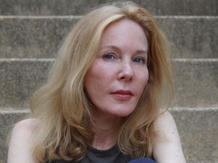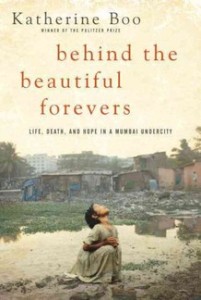The early reviews of Behind the Beautiful Forevers are declaring it THE book of the year. Slate.com called it “spellbinding.” Oprah picked it as a must-read for February. The New York Times published a glowing profile of author Katherine Boo, a Pulitzer Prize winning journalist and winner of a MacArthur “Genius” grant. A review in The Washington Post opened with the line, “This is an astonishing book.”
Despite all the accolades, I approached Behind the Beautiful Forevers with trepidation. Boo reports on the people who live, work, and survive in Annawadi, a makeshift slum in India that sits on the edge of the Mumbai airport. Boo’s brother, Tom, who happens to be a family care physician at our local Rural Health Clinic, emailed me the following. “Hope you like the book. The people’s stories are compellingly told and the writing good, but it can still be a tough read.”
Tom is right. Behind the Beautiful Forevers, and books like it, are hard to read. They make us feel guilty about our bright and shiny lives of privilege. They make us feel powerless to loosen the complicated ropes of poverty, hunger, and suffering that have a stranglehold on much of humankind.
So why do it? Why read Behind the Beautiful Forevers?
After finishing the first two chapters, I can give you three reasons.
First, Behind the Beautiful Forevers is exquisitely written. Boo weaves words with such tenderness and beauty that her book reads like a novel, which is part of the reason why it delivers such an emotional wallop. Her descriptions are at once lyrical and gritty, firmly planting each character in your mind. Before you know it, they’ve made a space for themselves in your heart, and that makes it all the more painful when you remember that this is not a made-up tale. Their experiences are very real, and are continuing to unfold halfway across the world even after we close the covers of the book.
Which leads to the second reason why you should read Behind the Beautiful Forevers. It is a book that can change everything.
I read the line “Every house was off-kilter, so less off-kilter looked like straight. Sewage and sickness looked like life,” and I began to see my own world differently. When I broadened my perspective to include the slums of Mumbai, petty irritations instantly dissolved. Minor misfortunes became easily manageable. In the days after beginning Behind the Beautiful Forevers, I was humbly grateful for the conveniences and Levitra 10mg privileges that cushion my life. I complained less. I appreciated more.
I have to wonder if an appreciation for this broader perspective is what compels Boo to do her work. Although she rarely speaks of it publicly, Boo was diagnosed with rheumatoid arthritis in her late teens. It affects her mobility and compromises her immune system. She used the money from her MacArthur grant to help pay for a surgery to repair her hands so she could continue to type.

But despite what she refers to in her Author’s Notes as her “lousy health,” Boo spent months at a time over a four-year period among the residents of Annawadi conducting interviews, recording video footage, and snapping photos. She hired interpreters to bridge the language barrier. She raised the ire of the local police. She hung around so much that she says the residents became bored with her. She even took a tumble into the nearby sewage lake. But Boo persisted, even when the stories she was recording tore at her heart. She told National Public Radio, “There were so many times when I was reporting in Annawadi that I would just come home and cry, because I didn’t think that I was going to be able to bring the stories to the page in a way that would make other people care.”
And that is the last and most important reason for reading Behind the Beautiful Forevers. In spite of her doubts, Boo wrote a book that makes us care. A book that renews our compassion and empathy. As challenging as it is to look suffering in the eye, it is of the utmost importance that we attach a face to the rising poverty statistics, that we humanize the poor. If we don’t, it is too easy to close our heart, snap shut our perspective, and shrink our compassion to a pitiful thimbleful. It is simpler to forget, but it is crucial to remember. To remember is to connect us as human beings.
And that is why I am deeply thankful to Katherine Boo for pushing past her own challenges to beautifully shape a vivid portrayal of a life in Annawadi. And that is why I will read Behind the Beautiful Forevers to the last page. Because even as painful as it is, I don’t want to forget. Ever.
East Side Books has signed copies of Behind the Beautiful Forevers for sale while supplies last.
